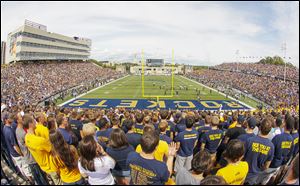
To the editor: Tax impact on college athletics
2/8/2018
University of Toledo fans watch as the Missouri Tigers score another touchdown during the third quarter at the Glass Bowl, Saturday, September 6, 2014.
Sports writer Kyle Rowland’s Feb. 4 article “Tax man coming for universities” began with this vituperous leading paragraph: “The usual divisive political rhetoric oozed out of Washington in December, when President Trump signed the Tax Cuts and Jobs Act, the $1.5 trillion rewrite of the tax code. Republicans roared with approval, while Democrats seethed with anger.” Need one read anymore? Could a factual account of the reshaping of collegiate tax monies follow? Making it sound like a Dickensian plot, the article pointed out that college athletics will receive a smaller piece of the tax pie or gravy train.
Having received athletic scholarship monies myself, as did my daughter years later, I still find myself not wanting to subsidize the gross and bloated salaries of big-name coaches who pull down more bucks than college administrators through tax twists. It is stunning that sports tickets were deductible like charity contributions.
In the new tax code, some 80 percent of households will receive tax cuts this year. The average middleman tax cut in 2018 will be $930. This is not diabolical ooze or something to produce seething and teeth gnashing. Report the facts; leave the interpretation to the reader. Unlike the Democrats at the State of the Union last week, I am not sitting on my hands with a grim expression but applauding the middleman’s tax cuts which is being redistributed from athletic coffers subsidized by taxpayers.
JENIFER CHRISTIAANSE
Sylvania
Click here to submit a letter to the editor | View the Behind The Readers’ Forum series
Contextualize the story for readers
In his Feb. 5 speech at Blue Ash, Ohio, President Donald Trump said that Congressional Democrats’ reaction to his state of the union address was un-American and perhaps even treasonous (Feb. 6, “Trump calls Dems’ action treasonous”).
Treason is a serious crime and The Blade’s reporting of the president’s words made it appear that he was serious, but it failed to provide the full context in which he made his statements. Anyone watching and listening to the video of the speech would have noted the smiles and laughter as he delivered his remarks. It was clear that Mr. Trump, who still talks and tweets as if he were a private citizen and not the elected leader of our nation, was not being serious.
Sometimes just reporting the facts in not enough. In this case, The Blade news service did not do a good job of telling the whole story.
ROBERT A. KELSO
Sylvania
Follow @BladeOpinion on Twitter.